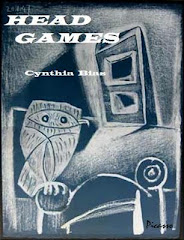HEAD GAMES SYNOPSIS
Psychological Fiction by Cynthia Bias
Craziness. If asked, could you recognize it? Most say “yes,” but are you sure? Even among psychologists and psychiatrists understanding of the phenomenon is murky. Theoretical disagreements abound as how to label and to categorize mental disorders, how to treat them, their origins, their expressions, even whether or not mental illness exists. In Head Games the reader is invited to explore the concepts of “mind” and “mental disorders” via a blend of fiction, fact, and multiple theoretical viewpoints, and thereby begin to draw his own conclusions. The story’s primary questions are, Who is crazy? and What is “crazy”? Answers to these questions will likely vary with the reader; the inevitable commonality will be that each character’s experience is best labeled “tragic.”
Head Games is set in two fictional towns: Woodmont, West Virginia and Pelican Point, South Carolina. The critical event that launches the story is the double-murder of the Donovan parents on Christmas Eve 1998, what detectives suspect was an act of parricide and that both Donovan siblings had opportunity to commit. The plot is complex and inextricably linked to the personal psychologies and pasts of the Main Characters:
JACK VALENTINE (Protagonist). Psychologist, man of compassion, and unconsciously driven to solve the Donovan murders. By chance he meets the Donovan siblings, first Philip then Blair, and is captivated by what is extraordinary in each. Soon, though, Jack finds himself caught in a triangle, one of manipulation and deceit, and tainted with the deaths of the Donovan parents and his own guilty part in his mother’s suicide. Despite their troubles his love for Blair deepens, as do his suspicions about the severity of Philip’s instability and their mutual desire to rid themselves of him. When Blair’s mounting desperation unbalances Jack—again, as with his mother—his sound judgment and professional ethics give way to a plan. In the end, however, he makes a fatal mistake...Jack falls asleep.
BLAIR DONOVAN (Protagonist). Gifted pianist, librarian, and secretive. Her long-standing fear and hatred of Philip, her adoptive brother, lead psychiatrists to suspect paranoia and delusion when she accuses him of murdering their parents. Indeed, Blair’s fantasies of revenge given attributed wrongs by him are many. Over time her love for Jack erodes her core mistrust, so more and more she confides in him; so more and more Philip plays head games with them until Blair’s spiteful retaliation devastates him. Eventually she and Jack conspire to entrap Philip—literally, in Blair’s crawl space—and expose him for who he is. Nevertheless, Blair’s ultimate revenge is at hand when insight strikes into Philip’s own suffering, a revelation and regret come too late.
PHILIP DONOVAN (Antagonist). Psychologist, exceptionally intelligent, and adopted son of Gwen and Philip Sr. While his professional accomplishments are remarkable, Philip’s personal relationships and sense of self are in ruin. Philip’s ambiguous role in his adoptive family results in a personality disorder of pathological narcissism, as well as in sexualized relationships with Blair and Bill Jordan. Inherited, however, is his tendency toward psychosis that results in the parricide, the legal culpability for which, at Blair’s expense, Philip contrives to evade for over five years. In the end he turns his father’s gun on himself—a crazy act or not?
MAGGIE MILLER aka NANA. The Donovan nanny for ten years. Young Philip rejects her when she leaves the family to marry but reunites upon his parents’s murders. Blair rejects her and her blind support of Philip after the murders and never turns back. Nana’s love for the kids remains constant as does the depth of her denial.
BILL JORDAN. Philip’s lifelong friend, lover, and alter ego…or is he? It is he who confronts Philip the final time and saves Blair from a lethal gun shot. Bill’s failure to protect Philip from himself, however, plunges him into guilt and self-blame.
Head Games is written in revolving third-person points of view and interior monologues with an important exception—Philip. Other than the prologue’s anonymous diary entry that the reader eventually learns was his, one must infer the nature of Philip’s personal psychology objectively, in the same way that any of us comes to know about another person’s mind. Bill is presented similarly. The theoretical perspectives are psychiatric, Jungian, Szaszian, Jaynesian, and Neo-Freudian. Symbolism permeates the story and contributes to its various levels of meaning, while psychological suspense captures the reader’s interest. The reader is presented with a puzzle, both emotional and intellectual, and along the way shares in the characters’s immediate experiences of living with what is now labeled “personality disorder” and “mental illness.”
(Word Count: 152, 788.)
Unpublished work © 2010 Cynthia Bias
+(3)+(Custom).jpg)
.bmp)